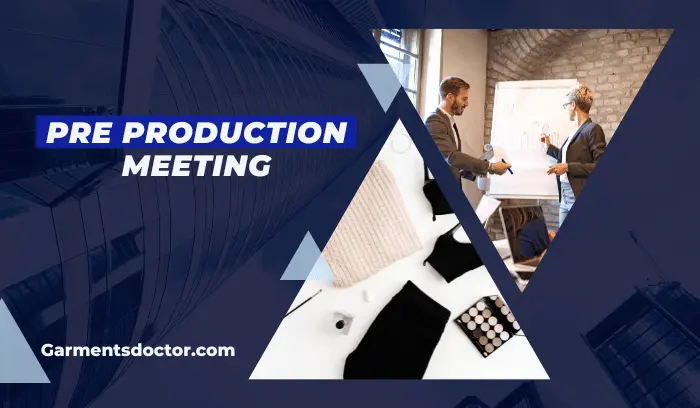What is PP (Pre Production) Meeting?
A Pre Production Meeting (PP Meeting) is mandatory against every order in the presence of the entire related person, IE, merchandiser, production, quality, QA, store, maintenance, & sample man. The merchandiser or QA team will arrange the Meeting & will discuss the buyer’s requirements using the format & record for further reference. Concern personnel will provide the size set sample with all the related paper and confirm the swatch as per the order sheet to follow production properly.
Importance of Pre-Production Meetings
Enhancing Communication: One of the primary objectives of pre-production meetings is to facilitate effective communication among different departments involved in the manufacturing process. By bringing together representatives from design, production, sourcing, quality control, and logistics, these meetings ensure that everyone is on the same page regarding project requirements and expectations.
Setting Clear Objectives: During pre-production meetings, clear objectives and targets for the upcoming production cycle are established. This includes defining production volumes, quality standards, delivery schedules, and any specific client requirements. Setting clear objectives helps align efforts towards common goals, thus improving overall efficiency.
Addressing Potential Challenges: Identifying and addressing potential challenges upfront is another crucial aspect of pre-production meetings. By conducting a thorough review of designs, materials, and production processes, potential bottlenecks or issues can be identified and mitigated proactively, reducing the risk of delays or quality issues during actual production.
Who will attend the Pre Production Meeting?
- Concerned Merchant
- Buyers Representatives
- Planning Coordinator
- Sample and CAD In-charge
- Production Manager
- Quality Manager
- IE manager
- Section In-charge (Store, Cutting, Sewing, Finishing & Washing)
- Quality Auditor
- Maintenance In-charge

Agenda of Pre-Production Meetings
The following issues must be discussed in the Pre Production meeting
- The quality standard of the buyer
- Approved sample comments from customers
- Inventory Report
- List of fabric & accessories, including shortage or excess quantity
- Approved trims card
- Production planning
- Fabric & Accessories Testing & Inspection Report
- Pattern, Marker, Ratio & Consumption.Fabric Shrinkage, GSM & Composition/Construction
- Approved print, Embroidery, and wash
- Line layout and required machine, tools & folder
- Critical operation or process
- Packing procedure and safety issues
- AQL Standard
- Required conditions & elements for inspection
- Delivery date
Pilot Run
The Pilot Run line aims to be ready to perform the product or style with the required Quality & specification.
The following team is required:
- Technician
- IE Assistant
- QA Assistant
- QC Supervisor from the respective line
- Manager/Supervisor from the individual line
- Operators as required
The following steps are taken for each of the different processes.
Cutting Section
- Maintain standard procedure of first cutting for any new style
- The first cutting should be performed by the same staff and workers handling & bulk-cutting
- Maintain all required quality parts recommended by the customer
- Maximum 200/300pcs should be cut, covering all sizes and colors
- Cutting lot should be performed in one shade
Sewing Section
- All machine operators and quality checkers should be instructed on styles in every
- particular operations they work on
- The technician, quality controller, supervisor, and respective machine operators
- should make correct mock-ups signed by the quality controller and hung on the individual machine
- The technical review should be continued in every stage of production
- After completing, the garments should be adequately checked & measured as per the approved spec sheet and sent for washing (if available)
Washing Section
All the pieces should be washed as per approved sample of washing for:
- Hand feel & appearance
- Shade variation
- Streak/Crease marks
- Nicking
- Washing defects
- Sewing defects
- Measurements variation
Finishing & Packaging Section
- Finishing should be done as per the approved sample
- The finishing and packaging trims should be used per the approved trim card
- Pack one carton as per the approved standard for technical review
- After technical consideration, the pilot run report should be submitted to the quality and merchandising department
Conclusion
Pre Production Meetings discuss all of the things that could be the problems in bulk production and how to solve the issues all departments want to ensure a smooth and efficient production process, reduce errors and defects, and deliver products on time. Effective communication and collaboration are critical to the success of these Pre Production meeting
Also Read: The Effective Pre Production Process In Garments Industry
FAQs (Frequently Asked Questions)
What is a pre-production meeting?
A Pre Production Meeting (PP Meeting) is mandatory against every order in the presence of the entire related person, IE, merchandiser, production, quality, QA, store, maintenance, & sample man. The merchandiser or QA team will arrange the Meeting & will discuss the buyer’s requirements using the format & record for further reference.
What is the purpose of a pre-production meeting in the garments industry?
The purpose of a pre-production meeting is to plan and coordinate production activities, set clear objectives, address potential challenges, and ensure efficient execution of production plans.
Who participates in pre-production meetings?
Pre-production meetings typically involve representatives from departments such as design, production planning, sourcing, quality assurance, and logistics, along with other stakeholders such as suppliers, clients, and external consultants.


